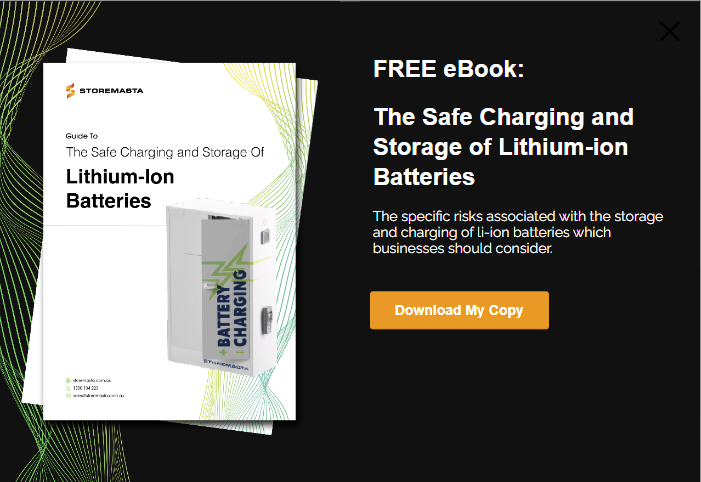Lithium-ion batteries can pose serious risks if thrown in with the general rubbish or the curbside recycling bin. But for businesses that deal with batteries day in, day out, the process of disposal can often be a confusing one.
In this post, we discuss the key hazards associated with battery disposal, and how you can take the necessary steps to ensure your lithium-ion batteries are being disposed of as per the regulations in your state or territory.
Can You Throw Lithium-ion Batteries in the Bin?
If you’ve ever asked a friend or colleague this question, we have the definitive answer for you. Absolutely not! Lithium-ion batteries – otherwise known as LIBs or Li-ion batteries – can cause fires in the waste disposal process.
Consider how you will dispose of or recycle your lithium-ion batteries.
Hazards of Incorrect Battery Disposal
These are just some of the ways in which LIBs can cause harm if they’re not disposed of correctly:
- Fire Hazard: Lithium-ion batteries contain highly flammable electrolytes. If damaged or short-circuited, they can catch fire or even explode. If compacted in a garbage truck or landfill, the pressure can cause them to rupture and ignite.
- Environmental Pollution: Lithium-ion batteries contain toxic chemicals like lithium, cobalt, and nickel. When disposed of improperly, these chemicals can leach into soil and water sources, causing environmental pollution and posing risks to wildlife and human health.
- Human Harm: In addition to environmental pollution, exposure to the chemicals in lithium-ion batteries can pose health risks to waste management workers and individuals living near landfills. Inhalation of toxic fumes from burning batteries or direct contact with leaked chemicals can lead to respiratory issues, skin irritation, and other health problems.
To reduce the risks associated with a lithium-ion battery, it’s essential to dispose of your battery correctly. However, when it comes to LIBs, this is not always a one-size-fits-all approach. There are different rules for households and commercial quantities of batteries, as well as the battery itself – and if it poses an immediate fire risk.
"Used batteries can’t be recycled in your regular recycling bin. In fact, contaminating your recycling bin with non-recyclable items can mean it all gets sent to landfill!. Putting used batteries in your regular rubbish bin can cause sparks and landfill fires. All batteries eventually corrode, and their hazardous contents leach out of landfill and into our soils and waterways, causing damage to wildlife and people."
Examples of Battery Fires in Recycling or Waste Processes
You don’t have to search too long to find another battery fire article online. Unfortunately, as the reliance of lithium-ion batteries increases, so to does the battery fire risk.
In recent years, it’s the waste collection process that has seen a string of battery fires – which pushes waste authorities to communicate battery safety with residents, so that these incidents are reduced.
Brisbane Waste Collection Trucks, 2024
The issue of the safety of waste collection services has been put in the spotlight as Redland City Council in Queensland issued a warning about lithium-ion batteries being put in the recycling bin or the general waste bin at residences.
Major Jos Mitchell stated, “This year, smoke or fire has been detected in two Redland City Council waste collection trucks, in Capalaba and Ormiston, and once at Redland Bay Recycling and Waste Centre. In these instances, Queensland Fire and Emergency Services was called and the loads needed to be disposed of in a controlled location.”
Residents have been urged to learn more about battery safety via the Queensland Fire and Emergency Services website. However, they have been told not to bring lithium-ion batteries to the Council Recycling Waste Centres “due to the fire risk”. Residents are urged to recycle batteries via B-Cycle.
Multiple Waste Management Fires NSW, 2023
A surge in house, waste facility and garbage truck fires has prompted the New South Wales Government to encourage people to consider lithium-ion battery safety.
Once incident involved the incorrect disposal of a lithium battery powered vaping device, which caused a fire in a Victorian recycling truck.
Canberra Recycling Centre Fire, 2022
A Canberra recycling centre was destroyed by a battery fire, which caused the recycling plant to be alight for days.
The blaze destroyed the warehouse in Hume, with the Emergency Services issuing smoke warnings for the community
City Services Minister Chris Steel stated, "Unfortunately we do see too many dangerous objects being put into the recycling stream that simply shouldn't be there, things like vapes, things like batteries, and even gas cylinders that can cause a hazard and a risk of fire."
Cairns Waste Collection Fires, 2023
Cairns Councillor Brett Moller, who is also Vice President of the Local Authority Waste Management Action Committee Inc, has warned residents of the “significant risk” posed by disposed batteries.
“In recent years we have seen significant infrastructure destroyed as a result of fires believed to be linked to the incorrect disposal of batteries,” Cr Moller explains. “Late last year, a fire destroyed the Hume Materials Recovery Facility (MRF) in Canberra, with a subsequent investigation finding multiple batteries of varying types in the remains of the fire.
“There was also a fire at recycling facility in Kwinana, Western Australia, around the same time, which has also been linked to lithium batteries.
Cr Moller urged Cairns residents to stop tossing batteries and e-waste into bins, and instead, dispose of them at transfer stations.
Rules for Safe LIB Disposal
As the disposal guidelines are different in different councils, as well as depending on the type and quantity of battery, it’s important to reach out to your local council waste disposal authority to first check if you can bring your lithium-ion batteries to their site.
Some councils allow some Li-ion batteries to be placed in dedicated sections of the waste disposal site, while others have completely prohibited them due to battery fire risk.
REMEMBER: If your council still allows lithium-ion batteries to be disposed of or recycled at their centre, make sure you inform the staff upon entry so you can place the batteries in the correct location.
Recycling Batteries
Recycling batteries is good for businesses — and the environment. You may be able to recycle your lithium-ion batteries via B-cycle or other battery recycling centres in your area.
Only certain types of batteries are allowed, though – and they must NOT be damaged.
How Do You Recycle Lithium-Ion Batteries?
If the batteries aren’t damaged, they may be recycled in a battery recycling collection bin – if available in your region.
While this varies between the states and territories, consider dropping off your LIBs to organisations such as:
- B-cycle
- Recycle Mate
- EPA
- Mobile Muster
- Planet Ark
- Australian Battery Recycler’s Initiative
Recycling Rechargeable Batteries
B-cycle is Australia’s official battery recycling scheme.
The scheme accepts a range of batteries including rechargeable lithium-ion batteries. However, B-cycle does not accept mobile phone or laptop lithium-ion batteries.
If you are recycling batteries through B-cycle, keep in mind that you must make sure that the recycling process is made safer by taping the terminals of your batteries to prevent sparks and battery fires.
Find out what you can take to your local B-cycle centre here.
Your recycling centre may not accept all types of batteries, as we have just discussed. However, there are dedicated channels that handle specific types of batteries.
Tech Battery Recycling Tips:
- To recycle mobile phone batteries, see Mobile Muster.
- To recycle laptop and computer batteries, see NTCRS.
- Embedded batteries may be recycled through local e-waste providers.
IMPORTANT: Some recycling centres do not cater for businesses – only households. So please check with your local battery recycling centre to see if your organisation is eligible.
Commercial Quantities of Li-ion Batteries
Are you dealing with commercial quantities of LIBs? Then different rules do apply to battery disposal.
If you’re working with large quantities of batteries on a regular basis, you’ll need to partner with a hazardous waste service provider to ensure that larger quantities of batteries are disposed of lawfully and safely. Talk to your service provider about your situation to find a solution that ensures safe and compliant battery disposal for your operations.
Can I Recycle Damaged Lithium-ion Batteries?
Due to the increased, and often immediate, fire risk, you must not attempt to recycle dadmaged lithium-ion batteries.
Damaged LIBs includes a range of safety issues including:
- Water affected batteries – salt or tap water can affect the safety of your battery, so consider water affected batteries as ‘damaged’ .
- Damaged – impact damage, such as dropping your battery, can create serious issues with lithium-ion battery safety. Cracks and dents are also signs that your battery could ignite.
- Swelling or bulging – swollen batteries are a telling sign that your battery poses a serious fire risk.
- Leaking – flammable electrolyte leaks are dangerous, and can lead to ignition.
- Punctured – these cells should never be hit or impacted and punctured batteries – just like any damaged Li-ion battery - can be extremely dangerous.
B-cycle explains that these damaged batteries should NEVER be thrown in bins, recycling bins or dropped off to recycling centres.
“Instead, place them in a fire-proof container (e.g. one made out of glass) and contact a B-cycle accredited Collector… for advice on safe disposal.”
Immediate Fire Danger: Over-heating & Off-Gassing Batteries
However, there are two safety issues that Fire Services in Australia have flagged as highly dangerous – where you should NOT consider the battery damaged, but instead, as an immediate threat.
These are when batteries are over-heating or off-gassing.
Evacuate the area and dial your local fire services if your lithium-ion battery is over-heating or off-gassing.
IMPORTANT: Do NOT dispose of damaged li-ion batteries in household bins, public or industrial bins or recycling centres. Contact your local council waste authority for information about the correct disposal procedures for damaged cells.
Reducing Fire Risk with Correct Battery Disposal
When it comes to the correct disposal of batteries, one thing is clear — you must never put these batteries, whether they are new, old or damaged — in the regular garbage or recycling bin. Lithium-ion battery fires are becoming increasingly prevalent, in both households and workplaces.
If you’d like to learn more about this emerging risk, why not download a copy of our free eBook. Our guide will help you learn how to handle and store these items to reduce the likelihood and impact of a battery fire.

Living life by the 4 C’s of marketing – communication, coffee, compliance… and more coffee – Leisa Andersen is Storemasta’s Content Marketing Manager. When she’s not writing, you’ll find her enjoying all the good things in life, including shopping, travel and gluten free donuts.


